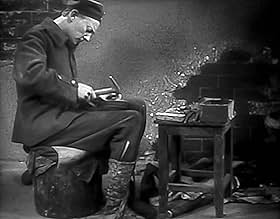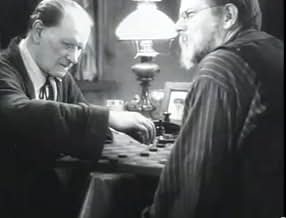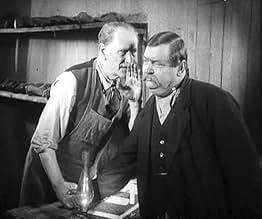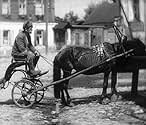Füge eine Handlung in deiner Sprache hinzuOutskirts is an internationally renowned masterpiece of early sound cinema. In a remote Russian village during World War I, colorful and nuanced characters experience divided loyalties: fami... Alles lesenOutskirts is an internationally renowned masterpiece of early sound cinema. In a remote Russian village during World War I, colorful and nuanced characters experience divided loyalties: family loyalty vs. personal desire, nationalism vs. transcendent humanism.Outskirts is an internationally renowned masterpiece of early sound cinema. In a remote Russian village during World War I, colorful and nuanced characters experience divided loyalties: family loyalty vs. personal desire, nationalism vs. transcendent humanism.
- Mueller III - German POW
- (as Gans Klering)
- Robert Karlovich - German boarder
- (as R. Yerdman)
- Smelchakov - cabdriver
- (as V. Uralsky)
- Master of the shoe shop
- (as A. Yermakov)
- Appearing
- (Nicht genannt)
- Town watchman
- (Nicht genannt)
Empfohlene Bewertungen
The transition from the more comedic parts to the horrors of war are quick, and often very abrupt. The clumsiness of the story comes from the odd pacing, with too-long bouts of time spent in the various places where the film takes place, making it difficult to transition back to the other story lines easily. The film is clearly struggling to fit the appropriate criteria laid forth by the Soviet Union, to tell the right story with the appropriate characters and the right messages. The stories we follow are compelling in and of themselves but the choppy pacing and the lack of technical finesse detract from the overall quality of this complex, multi-layered war film.
Barnet was really the most inconspicuous of Kuleshov's cycle, always quite apart from cinematic polemics raging at the time. He looked like a big lunkhead when we first see him as a cowboy in Kuleshov's Mr. West from '24. His first stab at directing assigned by his mentor, as I read, was a long serial on Fritz Lang territory about spies and counter-spies and international intrigue, except humorous and whimsical. He made another two silent comedies, one of which I've seen, very delicate and sweet-natured class conflict, almost dainty blood.
Now this, about events leading up to the Revolution of '17 and so by nature more sombre and reflective. Eisenstein and Pudovkin had turned out rigorously-driven paeans for the 10 year anniversary, Barnet's is something else altogether.
It is comedy about neighbors and brothers who are too stubborn to embrace true feelings, searing drama in the next beat about these mutual feelings sublimated in the massive conflict of war. It bleeds and you laugh with a laughter that is sadness.
It is plain fun to watch for the duration. There is sound but nowhere near as radical use as in Dezertir from that same year. Barnet was a much more gentle soul, eventually took his own life - the story goes - because he could no longer deliver art on the level he aspired to.
It's all in the ending here, a true apotheosis of cinematic expression and one of the best moments in 30's film, truly far-reaching stuff. You have to do the work though, it's not laid out in the open, submerged further afield where censors wouldn't have the imagination to apprehend him.
Two brothers have gone to war, the father receives news from the trenches that one has died, the young, rash one. Meanwhile a German POW has returned in his place; the same age, also a shoe-maker, a worker, and finds love in captivity the young brother was denied in an early scene on the same bench. The brother dead for a dubious cause has been surreally transmuted back home into a narrative that now turns vindictive, cruel, anxious - the German POW is summarily beaten by Russians, persecuted. Barnet's coup is that these scenes depict a Revolution under foot, a valiant cause in communist lore.
Meanwhile the older brother is still at the front fighting the war. We hardly ever see the German enemy, it's mostly exhausted soldiers futilely storming desolate no man's land. He calls off the bloodshed, single-handedly walking in the firing range and is summarily arrested by Russians as a traitor. The last news he hears is that the Winter Palace has been stormed. His response, on the threshold of consciousness: "what a rush!".
Barnet had Kuleshov's films to draw from on how to outwit the censors, but he outdoes even his mentor here in his ability to envision a multi-dimensional fabric.
The setting is the year 1914, first in a total backwater (we never know exactly where this town is, or if it's attached to something bigger, it's one town out of a thousand in Tsarist Russia) and then, as war breaks out, at the front as well. The plot is simply a series of episodes, initially comic though increasingly grim, depicting the ordinary folk. Though war is here and the great Soviet revolution is coming, the movie seems to offer little more than a sardonic Russian shrug toward such events, the people much more interested in love and clowning around. Like some other early Soviet talkies, Barnet makes a virtue of primitive Soviet sound technique by using sound expressionistically; the difference between this and a film like Pudovkin's Deserter is that Barnet often uses sound to blow a raspberry at whatever grandiose thing is supposed to be happening.
This vaguely avant-garde aspect has led a few critics like Jonathan Rosenbaum to call Outskirts an unknown masterpiece of cinema, but it's a little too rough and awkwardly put together for the name to fit comfortably. And more to the point, a Soviet masterpiece is something grand and auspicious, and this is a very different kind of film, closer in spirit to some of Godard's playful and absurdist early films, or to the casual working stiff's cynicism of 1960s Eastern European films like Menzel's Larks on a String, which mocked the pretensions and promises of Soviet society but were careful not to get too specific lest the censor's hand come crashing down. (Actually in both cases the hand came down anyway; Larks on a String was shelved for 20 years, and Barnet apparently got in trouble for Okraina, though by mid-30s Soviet standards he got off lightly and at least continued to work for another 25 years before committing suicide in the Brezhnev era.)
Even in our postmodern days, Barnet's hybrid of social realism, satire, romance, genre movie, musical and slapstick may be called eccentric. Rich, dynamic mise en scene is quintessential of this masterpiece condemnation of militarism, nationalism (and capitalism). It consists of two distinct parts, the first, pre-war one mixing realism with bizarre humour, the second delivering images of war rare in their docu-like naturalism far from Eisensteinian pathos.
The transfer on Mr. Bongo's recent release seems quite good ; regrettably no extras were taken from the original Ruscico version.
/To any reader of this interested in Barnet I would like to recommend another gem by this filmmaker - funny, charming and moving "Dom na Trubnoy" ("The House on Trubnaya Street"). It was recently released in France, with Russian intertitles and French subs (the movie is a silent one)./
Wusstest du schon
- WissenswertesThe only Soviet era film, before World War II, to deal exclusively with World War I.
- VerbindungenFeatured in Fejezetek a film történetéböl: A szovjet hangosfilm 1930-1953 (1990)
Top-Auswahl
Details
- Laufzeit1 Stunde 38 Minuten
- Farbe
- Sound-Mix
- Seitenverhältnis
- 1.37 : 1
Zu dieser Seite beitragen



































